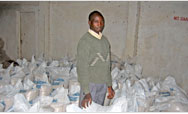You are here » Home » Telling Our Story
Success Story
The Orange Fleshed Sweet Potato becomes known for its value
Sweet Potatoes Take Center Stage

| |
Photo: USAID/Kim Wylie
|
|
Maria Mchele explains the benefits her new sweet potato crop has brought her near Mwanza, Tanzania.
“By eating sweet potatoes, including the leaves, people get more minerals, and even red cells get strengthened. We all believe this crop has improved the health of our children and those suffering from illness,” said Maria Mchele, a farmer and mother.
|
Maria Mchele is a single parent who farms a variety of vegetables by the shores of Lake Victoria an hour from Mwanza in Northern Tanzania. She is staunchly proud of her seven kinds of sweet potato crops, including the recently introduced Orange Fleshed variety. Long considered a second-rate crop and relegated to growing in household plots solely for family consumption, sweet potatoes are an increasingly hot commodity in Tanzania. Thanks to a USAID program, both women and men are learning that it is drought resilient, nutritious, and highly marketable, catapulting this potato from backstage to center-stage.
In spite of its proximity to Lake Victoria, Mwanza Region is affected by periodic drought and famine, and is increasingly hard-hit by HIV/AIDS. At a recent producer organization meeting, where women take the lead, the benefits of the Orange Fleshed Sweet Potato was evident. Maria joined other members in praising the value of this new source of energy and income. Several women promoted the link between sweet potato consumption and improved health. One farmer, undaunted by the stigma often associated with AIDS, identified herself as HIV positive and said: “Eating sweet potatoes rich in Vitamin A has helped to strengthen my immune system and give me more energy.” A community nurse stood and observed that children who eat corn mixed with the more nutritious sweet potato become more healthy and active. A young woman nursing her 18-month-old HIV positive baby boy later insisted that her child recovers from illness more rapidly when the potato complements other staple (but less nutritious) foods.
The farmers are also learning to move beyond the daily grind of subsistence farming; they plan when to sew the seeds, target prospective buyers, help each other store and care for their harvests. They’re also saving money. Two women brought forth a locked storage box, proudly showing the pass books and ledger for their group’s savings account. Farmers are learning about pest management, using methods that help protect soil fertility while saving crops. These farmers have often said they need to see something before believing it; after seeing the benefits of the sweet potato, they have become its staunchest advocates.
Print-friendly version of this page (516kb - PDF)
Click here for high-res photo
Back to Top ^ | 

